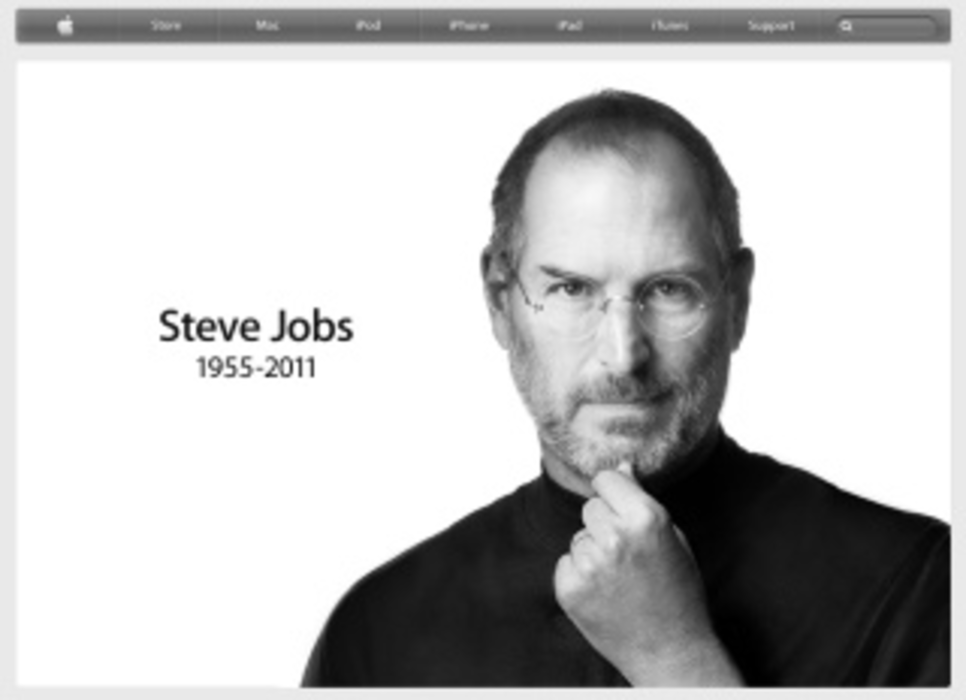The death of Apple founder and tech pioneer Steve Jobs on Oct. 5 triggered an avalanche of online and print reaction, as writers around the world struggled to eulogize a man whose name is synonymous with innovation. But how can anyone – in 140 characters, 10 graphs or 1,000 pages – properly sum up a life? Especially when that life irrevocably altered just about everyone else’s?
The world tried. Twitter was in a frenzy over Jobs’ death Wednesday night, and by this morning, five of the top 10 trending topics were related to the news.
A Twitter user named Anthony Shaw used one of the trending hashtags – #iSad – to Tweet simply: “Our hearts are syncing.” Other trending topics related to Apple and paired with Tweets of Jobsian quotes and statements of grief include #ThankYouSteve, #Macs, #ThinkDifferent and #StayHungry, a concept that is a part of one of Jobs’ oft-cited speeches. A popular message on the network today: “Retweet this if you are touching an Apple product.”
The new iPhone, which was released to lackluster reviews just one day before Jobs’ death, stepped into the shadow of its creator as he lost his very public battle with a rare form of pancreatic cancer.
In eulogies by major news outlets, on blogs and in bite-sized Tweets, a common theme quickly emerged: “Steve Jobs changed ________.” Twitter user EducationWeek filled that blank with “classroom culture.” CNTraveler answered the question with “the way we travel and the way we share our travels.” Slate went all the way and said Jobs “invented our modern world.” And the blog Signal vs. Noise cut to the chase and made a list of all the things it says Jobs changed forever.
Advertising is, of course, on that list.
In 2010, Apple transformed digital marketing with the release of the iPad and the iAd platform. The latter allows brands to run campaigns specifically for Apple’s audience, which the company boasts is composed of “the world’s most engaged, influential and loyal consumers,” who spend an average of 60 seconds of each online visit engaging with an iAd ad. A year and a half later, not everyone is sold on the technology. But as in the past, Apple’s idea is the seed of a thousand others. At a forum in New York City this week covered by Direct Marketing News‘ Heather Schultz, Yahoo debuted a product called LivingAds, slated for release this fall, that leverages the tactile and motion-sensitive capability of tablets to create more interactive advertising experiences.
The iPhone, first introduced to the market in June 2007, brought with it an attractive display for ads and apps that companies could use to engage customers. Technological advances on the heels of the iPhone include the now-common QR code, which lately has become an indispensable part of the marketing space.
But Jobs was changing advertising long before tablets or the iPhone penetrated the scene (and your pocket). The self-trained marketing guru built his success on breaking a cardinal rule – give your customers what they want. “It’s not the consumers’ job to know what they want,” The New York Times quoted Jobs in its obituary.
What they wanted – but didn’t know they wanted yet – was not just the shiny new product but the digital lifestyle such products create.
U.K.-based Marketing Magazine points out that Jobs was also the pioneer of the “secret product launch” and was the first to focus on marrying design with technology.
“Informed by a personal vision of ‘what could be’ — as opposed to one driven by market research — Steve Jobs imagined devices that were more than the sum of their parts and which became an extension of the user’s needs, desires and aspirations,” Mobile Marketing Association CEO Greg Stuart said in a statement. “His genius in advertising from the iconic ‘1984′ ad to the ‘Think Differently’ campaign and to ‘iAds’ — linking product, function and message — blazed a marketing trail that few have been able to follow.”
For CRM and cloud computing company Salesforce.com, the Apple founder’s impact was even more direct, according to the LA Times. CEO Mark Benioff was an Apple employee in the 1980s and frequently called upon mentor Jobs for guidance as he built his company.
Benioff reportedly sent a letter to Salesforce.com employees yesterday to express his sorrow over Jobs’ death. He is quoted as saying: “There would not be a Salesforce.com without Steve Jobs.”
Without Steve Jobs, who knows what else marketers and consumers would be missing out on?








